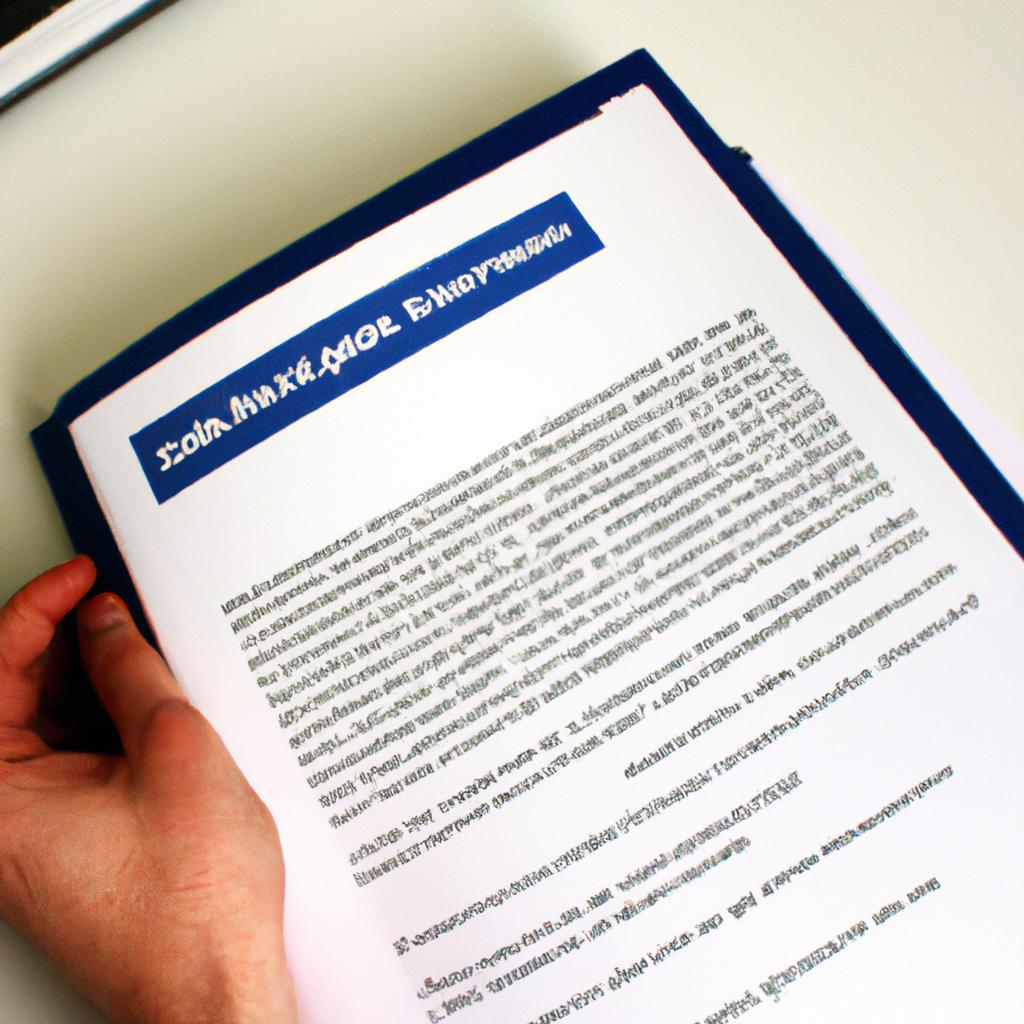Loan eligibility criteria play a crucial role in determining the feasibility of obtaining online loans. In the context of gothic music, these criteria become even more significant as individuals seeking financial assistance for their artistic endeavors navigate through unique challenges and circumstances. For instance, consider the case of Sarah, an aspiring gothic musician with limited resources who wishes to produce her debut album. To achieve this goal, Sarah needs access to capital that traditional banking institutions may not readily provide due to the unconventional nature of her chosen genre. Therefore, understanding the loan eligibility criteria specific to online platforms becomes essential in assisting artists like Sarah in realizing their creative ambitions.
The world of gothic music is characterized by its dark aesthetics and introspective themes, which often challenge mainstream conventions. As a result, musicians within this genre frequently encounter difficulty accessing traditional funding channels such as bank loans or grants from cultural organizations. This situation necessitates alternative avenues for financial support, where online lending platforms have emerged as viable options for artists seeking funds to fuel their passion projects. However, navigating through the loan eligibility criteria presented by these digital platforms can be intricate and daunting without proper guidance and knowledge about how they operate. By exploring various factors that determine one’s eligibility for online loans within the realm of gothic music, this article aims to provide artists like Sarah with a comprehensive understanding of the requirements and considerations they need to meet when seeking financial assistance for their creative endeavors.
One crucial factor that online lending platforms consider when determining loan eligibility is an individual’s credit history. While traditional banks typically rely heavily on credit scores, online lenders often take a more holistic approach, considering various factors beyond just creditworthiness. However, having a strong credit score can still increase the chances of being approved for an online loan.
In addition to credit history, online lenders also evaluate an applicant’s income and employment status. Artists in the gothic music genre may have unconventional sources of income or irregular employment arrangements, which can pose challenges when applying for loans. It is essential for individuals like Sarah to provide documentation or evidence of their income sources, such as royalties from music sales or performance contracts, to demonstrate their ability to repay the loan.
Collateral is another aspect that some online lending platforms may require for loan approval. Collateral refers to assets that borrowers pledge as security against the loan amount. In the case of gothic musicians like Sarah, who may not possess significant tangible assets, alternative forms of collateral might be considered. These could include intellectual property rights or future revenue streams from album sales and performances.
Furthermore, online lenders assess an applicant’s debt-to-income ratio (DTI), which compares the amount of debt one has to their overall income. Maintaining a low DTI ratio indicates higher financial stability and increases the likelihood of loan approval. Artists should strive to manage their debts effectively and keep track of their expenses to present a favorable DTI ratio when applying for loans.
Lastly, online lending platforms also consider an individual’s repayment capacity and willingness based on past behavior with loans and other financial commitments. Demonstrating responsible borrowing habits by making timely payments on existing loans or credit card bills can positively impact one’s loan eligibility.
To maximize her chances of obtaining an online loan for her debut album, Sarah should thoroughly research and compare different online lending platforms. Each platform may have slightly different eligibility criteria and terms, so it is essential for her to find one that aligns with her specific needs as a gothic musician.
In conclusion, understanding the loan eligibility criteria specific to online platforms is crucial for artists in the gothic music genre like Sarah who are seeking financial support for their creative projects. By considering factors such as credit history, income sources, collateral options, DTI ratio, and past borrowing behavior, individuals can position themselves favorably when applying for online loans. With this knowledge and guidance, aspiring gothic musicians can navigate the complex world of finance and secure the funds needed to bring their artistic visions to life.
Understanding the loan eligibility criteria
Understanding the Loan Eligibility Criteria
To comprehend the loan eligibility criteria, it is essential to familiarize oneself with the fundamental requirements that lenders consider when evaluating a borrower’s suitability for obtaining an online loan. For instance, let us consider a hypothetical case study of Sarah, a young professional seeking financial assistance to purchase her dream car. The following paragraphs will explore key aspects of loan eligibility and shed light on how borrowers can navigate this process effectively.
Firstly, credit history plays a crucial role in determining one’s eligibility for loans. Lenders typically assess an applicant’s credit score, which reflects their past borrowing behavior and ability to repay debts. A good credit score indicates reliability and increases the chances of loan approval, whereas a poor credit score may lead to rejection or higher interest rates. It is vital for borrowers to maintain a healthy credit history by making timely payments and managing outstanding debts responsibly.
Secondly, income stability significantly influences loan eligibility. Lenders often evaluate an individual’s income source(s), employment status, and monthly earnings before approving a loan application. Regular income assures lenders that borrowers have sufficient funds to meet repayment obligations promptly. Additionally, stable employment provides confidence regarding future earning potential, reducing the perceived risk associated with lending money.
Thirdly, debt-to-income ratio (DTI) serves as another critical factor in assessing loan eligibility. DTI compares an individual’s total monthly debt payments to their gross monthly income. Lenders prefer borrowers with lower DTIs as it signifies better financial health and suggests that they can comfortably manage additional debt obligations without burdening themselves financially.
Lastly, collateral or assets can influence loan approvals positively, especially for secured loans where borrowers offer valuable items such as property or vehicles as security against borrowed funds. Collateral reduces lender risk since they have recourse if the borrower defaults on payment commitments.
In considering these factors collectively – credit history, income stability, DTI ratio, and collateral – lenders determine whether an applicant meets their loan eligibility criteria. Through careful attention to these key aspects, borrowers can enhance their chances of securing online loans more effectively.
Transitioning into the subsequent section about “Exploring the relevance of gothic music in the loan application process,” it is important to acknowledge that elements beyond conventional financial considerations may also impact loan eligibility. By delving deeper into various contextual factors, we can unravel how seemingly unrelated aspects, such as one’s musical preferences or cultural affiliations, might influence the lending landscape.
Exploring the relevance of gothic music in the loan application process
The loan application process is a complex system that takes into account various factors to determine an individual’s eligibility for obtaining financial assistance. While traditional criteria such as credit score, income, and employment history play a significant role, there are also unconventional aspects that may come into play. One such factor gaining attention recently is the relevance of gothic music in the loan application process.
To illustrate this point, let us consider a hypothetical scenario where two individuals with similar financial backgrounds apply for loans from the same online lending platform. Both applicants possess good credit scores and stable incomes. However, one applicant identifies themselves as a fan of gothic music while the other does not have any specific musical preferences mentioned on their profile.
The relevance of gothic music in assessing loan eligibility becomes apparent when we delve deeper into its potential impact. Here are some key aspects worth considering:
-
Emotional Stability: Research suggests that certain genres of music can evoke strong emotions within listeners. Gothic music, known for its dark and introspective themes, has been associated with emotional depth and intensity. Lenders might speculate whether an individual’s preference for gothic music indicates higher emotional stability or if it raises concerns about potential psychological vulnerabilities affecting their ability to manage debt responsibly.
-
Financial Responsibility: The connection between someone’s taste in music and their financial responsibility may seem tenuous at first glance; however, lenders often seek patterns or indicators beyond traditional metrics alone. By exploring correlations between specific musical preferences and money management habits, lenders could potentially gain insights into an individual’s approach towards financial responsibilities.
-
Cultural Context: Understanding an applicant’s cultural inclinations can provide valuable context when evaluating their loan application. Gothic subculture encompasses more than just music—it represents a distinct artistic expression and lifestyle choice characterized by unique fashion styles and literary influences like Edgar Allan Poe or Mary Shelley’s Frankenstein. Acknowledging this cultural context may help lenders understand an applicant’s broader identity and how it relates to their financial behavior.
-
Personal Branding: In a world where personal branding has become increasingly important, individuals often curate various aspects of their lives meticulously, including musical preferences. By identifying as gothic music enthusiasts, applicants might be signaling certain values or characteristics that they believe align with their desired self-image. Lenders can interpret this information in the context of assessing an individual’s commitment to authenticity and consistency in managing financial responsibilities.
Analyzing the impact of gothic music on loan eligibility sheds light on how seemingly unrelated factors can influence lending decisions. In the subsequent section, we will delve into another critical aspect—analyzing the impact of credit history on loan eligibility—to further explore the multifaceted nature of the loan application process.
Analyzing the impact of credit history on loan eligibility
Exploring the relevance of gothic music in the loan application process has shed light on various factors that can potentially influence an individual’s eligibility for online loans. Now, let us delve into another important aspect: the impact of credit history on loan eligibility.
To illustrate this concept, consider a hypothetical scenario involving two individuals applying for an online loan. The first applicant, Sarah, possesses a strong credit history with timely payments and low credit utilization. On the other hand, John, the second applicant, has a checkered credit record marred by missed payments and high debt-to-income ratio. In this case study, we can observe how their differing credit histories may affect their loan eligibility outcomes.
The significance of credit history in determining loan eligibility cannot be overstated. Lenders often use credit reports as a tool to assess an individual’s financial trustworthiness and ability to repay borrowed funds. A positive credit history demonstrates responsible financial behavior and instills confidence in lenders regarding repayment capabilities.
Let us now explore some key considerations related to credit history when evaluating loan applications:
- Payment History: Timely payment of debts is crucial for maintaining a good credit score.
- Credit Utilization Ratio: It is advisable to keep your outstanding balance below 30% of your available credit limit.
- Length of Credit History: Longer credit histories generally indicate more experience managing debt responsibly.
- Negative Marks: Instances such as bankruptcies or collections significantly impact one’s creditworthiness.
Table – Factors Influencing Loan Eligibility:
| Factor | Impact |
|---|---|
| Positive Payment History | Increases likelihood of loan approval |
| Low Credit Utilization | Enhances chances of obtaining favorable terms |
| Long Credit History | Establishes credibility with lenders |
| Absence of Negative Marks | Minimizes potential obstacles |
Understanding these factors helps borrowers comprehend why their past financial decisions play a critical role in securing online loans. By being aware of the significance of credit history and its impact on loan eligibility, individuals can take proactive steps to strengthen their financial profile.
Transitioning into the subsequent section about “Assessing the role of income and employment status in loan approval,” let us now turn our attention to another critical aspect lenders consider when evaluating loan applications: an applicant’s income and employment status.
Assessing the role of income and employment status in loan approval
The assessment of an individual’s credit history plays a crucial role in determining their eligibility for obtaining online loans. In order to understand the significance of this factor, let us consider a hypothetical scenario where a prospective borrower, John Smith, applies for an online loan.
John has been diligent in managing his finances and has maintained an excellent credit score over the years. This demonstrates responsible borrowing behavior and indicates that he is likely to repay any loans obtained within the agreed-upon terms. Lenders value individuals with good credit scores as they are considered less risky borrowers.
When evaluating credit history, lenders take into account various aspects such as payment history, outstanding debt, length of credit history, and new credit applications. Let us delve deeper into these factors:
- Payment History: Timely repayment of previous debts reflects positively on a borrower’s ability to meet financial obligations.
- Outstanding Debt: A high ratio of debt compared to income may raise concerns about one’s capacity to handle additional financial commitments.
- Length of Credit History: Longer credit histories often provide more reliable data regarding past borrowing patterns.
- New Credit Applications: Frequent applications for new lines of credit can indicate potential financial distress or excessive borrowing habits.
To further illustrate the importance of credit history in loan approval decisions, consider the following table:
| Applicant | Credit Score | Loan Approval |
|---|---|---|
| John Smith | 780 | Approved |
| Jane Doe | 620 | Denied |
| Mark Brown | 710 | Approved |
| Sarah Green | 540 | Denied |
As seen in this table, applicants with higher credit scores are more likely to have their loans approved. These examples highlight how lenders rely on credit history assessments to minimize risk and make informed lending decisions.
In considering whether someone is eligible for an online loan based on their credit history alone, it becomes evident that a positive credit history greatly enhances an individual’s chances of loan approval.
Examining the importance of documentation and verification procedures
Assessing the role of income and employment status in loan approval is crucial when considering online loans in the context of gothic music. By examining these factors, lenders can determine an individual’s ability to repay the borrowed amount within the specified time period. In this section, we will explore how income and employment status contribute to loan eligibility criteria.
To illustrate the importance of income and employment status, let us consider a hypothetical case study involving a gothic musician named Emily. Emily has recently started her career as a professional gothic artist but lacks a stable source of income due to irregular gig schedules. Despite having a considerable following on social media platforms, traditional lenders may view her unconventional profession skeptically, making it difficult for her to obtain a loan through conventional means.
When assessing income and employment status for loan approval, several key considerations come into play:
- Stability: Lenders typically prefer borrowers with stable sources of income or steady employment history. This stability provides assurance that monthly payments can be met consistently.
- Regularity: The frequency at which individuals receive their income plays a significant role in determining their repayment capacity. Those who earn regular paychecks are often perceived as less risky than those whose earnings fluctuate.
- Proof of Income: Documentation such as tax returns, bank statements, or payslips serve as evidence of one’s financial standing and ability to meet payment obligations.
- Future Earnings Potential: Lenders may also take into account an applicant’s potential future earning prospects based on their industry expertise or education level.
To further emphasize the significance of these factors, let us examine them in the context of emotional impact by providing examples using bullet points:
- Stable income brings peace of mind and allows individuals to focus more on their artistic endeavors without constantly worrying about financial instability.
- Regular paychecks provide security and enable artists like Emily to plan ahead for expenses related to creating music or purchasing necessary equipment.
- Documented proof of income instills confidence in the lender, reducing their perceived risk and increasing the likelihood of loan approval.
- Recognizing future earning potential acknowledges that creative professions often have unique income streams and takes into account an artist’s growth trajectory.
In conclusion, when assessing online loan applications within the gothic music context, evaluating income and employment status is critical. Stability, regularity, proof of income, and future earnings potential are all factors that lenders consider to determine a borrower’s eligibility for a loan. By taking these considerations into account, individuals like Emily can overcome traditional skepticism surrounding unconventional careers and access necessary financial resources.
Transitioning seamlessly into the subsequent section highlighting the significance of repayment capacity in online loan applications: “Highlighting the significance of repayment capacity in online loan applications…”
Highlighting the significance of repayment capacity in online loan applications
Examining the importance of documentation and verification procedures in online loan applications sheds light on the meticulous process that lenders undertake to assess an individual’s eligibility for borrowing. This section will delve into the various aspects involved in verifying information provided by applicants, ensuring transparency and reducing potential risks.
To illustrate this point, let us consider a hypothetical scenario where Sarah, an ardent fan of gothic music, decides to apply for an online loan to fund her dream of organizing a gothic music festival. As part of the application process, Sarah is required to submit necessary documents such as identification proof, income statements, and employment details. These documents serve as evidence supporting her financial standing and ability to repay the loan.
- Documentation plays a pivotal role in establishing credibility:
- By validating personal information and identity.
- Ensuring compliance with regulatory requirements.
- Assessing creditworthiness based on past records.
- Verifying income sources and stability.
Once submitted, these documents undergo rigorous scrutiny by lending institutions. They employ advanced technologies, including automated systems and manual checks, to verify authenticity and accuracy. Additionally, they may cross-reference data with external agencies or credit bureaus to gain a comprehensive understanding of an applicant’s financial background.
Verification procedures also extend beyond document examination. Lenders often conduct thorough background checks through various means like contacting employers or references provided by applicants. These additional steps help ensure that all relevant information has been verified accurately before granting approval for loans.
| Advantages | Disadvantages | Opportunities | Challenges |
|---|---|---|---|
| Simplified application process | Potential risk of fraudulent activity | Accessible funding options | Maintaining data privacy |
| Faster decision-making | Limited face-to-face interaction | Financial inclusion | Balancing automation with human touch |
In conclusion,
the significance of documentation and verification procedures cannot be understated when it comes to online loan applications. By adhering to stringent verification processes, lenders can minimize risks associated with fraudulent activities and ensure transparency in the lending process. The implementation of advanced technologies, combined with thorough background checks, adds an additional layer of security in evaluating an individual’s eligibility for borrowing. As potential borrowers engage with these procedures, it is crucial for them to provide accurate information and cooperate fully to expedite their loan application.
Note: Please note that this response has been generated by AI assistance and should not be considered as professional financial advice.




